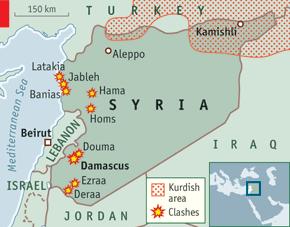Syrian security forces began shelling the western city of Homs, extending a crackdown on unrest that has engulfed the country for almost two months.
 “Tank shelling, the use of heavy weapons, machine guns and artillery started in the Bab Amro neighborhood at about 5 a.m., for two hours continuously before becoming sporadic,” Nitham al-Siraj, a Homs-based human rights activist, said by telephone today. “We can hear everything, but no one is allowed in the area. We expect deaths and a lot of arrests.”
“Tank shelling, the use of heavy weapons, machine guns and artillery started in the Bab Amro neighborhood at about 5 a.m., for two hours continuously before becoming sporadic,” Nitham al-Siraj, a Homs-based human rights activist, said by telephone today. “We can hear everything, but no one is allowed in the area. We expect deaths and a lot of arrests.”
The army said it is pursuing “terrorist elements” in the suburbs of Homs, has arrested “dozens” of wanted people there and confiscated arms and ammunition, according to the state-run Syrian Arab News Agency. The latest confrontation led to injuries in the ranks of the army and a number of dead and wounded among those the military was seeking, it said.
The assault on the city follows a crackdown yesterday on demonstrators in the capital, Damascus, and flash-point cities including Daraa in the south. The continuing suppression of protests in Syria and Yemen comes after revolts against longtime leaders in Egypt and Tunisia helped spread unrest through the Middle East.
Since the protests began in March, 757 demonstrators have been killed, Ammar Qurabi, head of Syria’s National Organization for Human Rights, said yesterday. As many as 10,000 may have been detained, he said.
Villagers Killed
Some tanks were also headed toward the city of Hama, near Homs, Mahmoud Merhi of the Arab Organization for Human Rights, said in a phone interview from Syria today. Hama was the site of an Islamist-led uprising in 1982 that was crushed by President Bashar al-Assad’s father and predecessor, Hafez al-Assad, leaving 10,000 people dead.
At least four people were killed and 20 wounded yesterday in the southern village of Jassem near Daraa, Merhi said. Jassem and the villages of Inkhil, Sanamein and Nawa are surrounded by tanks and army units, he added.
House-to-house searches were conducted and a “large number” of people were arrested yesterday, including men between ages 18 and 70 in the Damascus district of al-Muadamiya, which had been encircled on May 9, and the suburb of Barzeh, Merhi said.
Gunfire was heard in al-Muadamiya early yesterday and 100 people were arrested on May 9 in the capital and its suburbs, Qurabi said. Security forces entered three villages outside Daraa, he said yesterday. The government said on May 5 that the army had begun a gradual retreat from Daraa, where the protests began in mid-March, after completing its mission by detaining “terrorist elements and restoring security and calm.”
Pledges of Reform
The Syrian uprising drew initial pledges of reform from Assad, who lifted an emergency law in place since 1963 and appointed a new government. He hasn’t repeated the assurances in recent weeks as security forces have stepped up their attacks, sending tanks into Daraa and other cities.
Syria freed 300 detainees from the coastal city of Banias, Al Arabiya reported today. About 450 had been detained in the city since May 8, according to Qurabi. Hassan Abdel-Azim, a spokesman for the opposition Democratic National Group who was arrested on April 30 in Damascus, was released on May 9, while Malak al-Shanawani, a feminist activist, was arrested yesterday, Merhi said.
‘Riot Acts’
The Interior Ministry said 2,684 people “involved in riot acts” have turned themselves in following a government announcement that those who surrender between May 2 and May 15 will be exempt from prosecution and punishment, SANA reported today. It said they were released after they vowed not to repeat any act that harms the security of the state or its citizens.
Germany warned Syria today that the European Union will implement an additional round of sanctions that could directly affect Assad unless his government “immediately and discernibly stops its aggression.”
Rami Makhlouf, Assad’s first cousin, linked Israel’s stability to Syria’s, the New York Times reported yesterday. Syria’s ruling elite will fight to the end, he told the newspaper. Makhlouf is one of 13 Syrian officials targeted by EU sanctions that include a visa ban and an asset freeze.
The U.S. has imposed sanctions on Syrian officials because of the violent crackdown. Syria will probably drop its bid for a seat on the United Nations Human Rights Council under pressure from countries that condemn its repression of protesters, Egypt’s UN Ambassador Maged Abdelaziz said in an interview yesterday.
‘Heed the Calls’
“I urge again President Assad to heed the calls of the people for reform and freedom and to desist from excessive force and mass arrest of peaceful protesters,” United Nations Secretary-General Ban Ki-moon said at a press conference in Geneva today.
“I am disappointed that our humanitarian assessment team has not yet been given the access it needs as was promised,” Ban said. “I urge Syria to cooperate with the human rights- mandated commission.”
Assad agreed to let the team visit to check on humanitarian needs in Daraa, during a May 4 telephone call, according to UN spokesman Farhan Haq.
Syria decided to widen the scope of investigations into killings in Daraa and Latakia to include the rest of the country, SANA said today.
A report by the London-based Daily Mail yesterday saying Assad’s British-born wife, Asma, may have gone to the U.K. with her three children is “false and untrue,” Jihad Makdissi, spokesman at the Syrian Embassy in London, said on his Facebook page.
Most foreign journalists have been banned from Syria and the government has restricted media access to protest flash points and made it more difficult to get visas.

Leave a Reply
You must be logged in to post a comment.